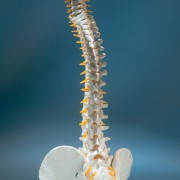I don’t doubt any kind of fracture is a painful, frustrating injury, but I have to believe a spinal compression fracture is slightly more painful, slightly more scary, and quite dangerous. Any injury pertaining to the spine gives me the goosebumps because it is the center of your existence. So, all scary thoughts aside, let's get down to the nitty gritty of this type of fracture.
As vague as a back ache or pain may seem, they also are the first sign of a spinal compression fracture. Approximately two thirds of spinal compression fractures are never diagnosed because many people chalk their back pain up to aging and life in general. I know I have a back ache more than I don’t have one, and nothing would have triggered me to think about the possibility of a spinal compression fracture prior to researching this injury. Now I am slightly paranoid and considering diagnosing myself – but then again I am a hypochondriac, so please don’t listen to me and self diagnose. In all seriousness, if you are having frequent back pain in the same section, it may behoove you to see a doctor to determine if a spinal compression fracture is a possibility.
Although there are certain pre-existing conditions such as osteoporosis or cancer that spreads to you bones, anyone is really at risk for this. If you have soft or weak bones, something so simple like bending over to lift something, slip on slippery flooring or a misstep can cause a spinal compression fracture. Also at a higher risk is being too thin, being a women over 50, and malnutrition.
While many continue to prolong seeing a doctor about their “normal” back pains, you may be setting yourself up for disaster. I say this because your spine may have seen many small spinal compression fractures over an extended period time without you even knowing. After a number of them, you will certainly see and feel the consequences of waiting. Those small fractures can leave permanent damage, altering the shape and strength of your spine. And if you are vertically challenged to begin with (like my mother, sister, aunt, grandma and grandpa), then you won’t look forward to hearing that you can lose height because your spine is ultimately shorter.
Although back pain can be one of a million things, don’t be so fast to rule out a spinal compression fracture. Your spine is very fragile and must be handled with care. To find out more of the treatment for spinal compression fractures, including Kyphoplasty, check for my next article on this topic.





Add a CommentComments
There are no comments yet. Be the first one and get the conversation started!